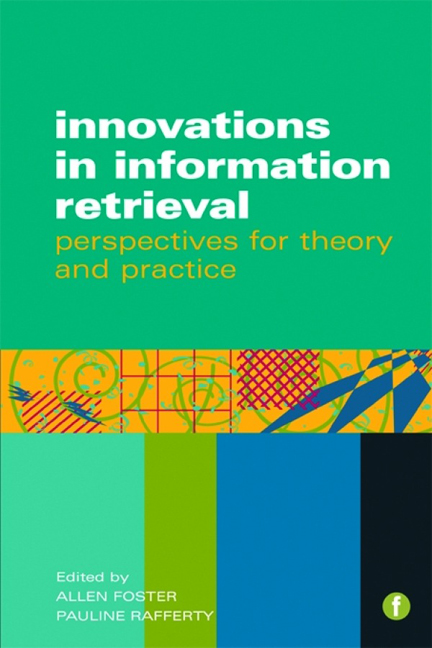Book contents
- Frontmatter
- Contents
- Figures and tables
- Contributors
- Foreword
- Introduction
- 1 Encountering on the road to Serendip? Browsing in new information environments
- 2 Classification revisited: a web of knowledge
- 3 Approaches to fiction retrieval research: from theory to practice?
- 4 Music information retrieval research
- 5 Folksonomies, social tagging and information retrieval
- 6 Digital information interaction as semantic navigation
- 7 Assessing web search engines: a webometric approach
- Index
4 - Music information retrieval research
Published online by Cambridge University Press: 08 June 2018
- Frontmatter
- Contents
- Figures and tables
- Contributors
- Foreword
- Introduction
- 1 Encountering on the road to Serendip? Browsing in new information environments
- 2 Classification revisited: a web of knowledge
- 3 Approaches to fiction retrieval research: from theory to practice?
- 4 Music information retrieval research
- 5 Folksonomies, social tagging and information retrieval
- 6 Digital information interaction as semantic navigation
- 7 Assessing web search engines: a webometric approach
- Index
Summary
Introduction
There is a long history of music librarianship in the domain of printed Western classical music. Special schemes have been developed to aid in the organization and retrieval of musical works, and existing schemes have been widely used to include these types of documents in larger physical library collections. However, the advent of digital consumer technology in the form of MP3 players and mobile phones, combined with the enormous impact of the internet and the digitization and ease of compression of audio files, has brought new formats and types of user interaction to the fore. This has led to an explosion in music information-retrieval research, concentrating on how most beneficially to use computers to organize, search and retrieve music information and recordings from large digital collections.
Many of us today carry around music collections of thousands of digitized music recordings and access all manner of types of music on the web, but still are unsure what to listen to next: the enormous size of these collections and the instant accessibility of 8 million Western pop, classical, jazz and folk songs can cause confusion and trepidation. Where the classical music researcher would previously have consulted academic texts and visited a specialist music library, or the post-rock listener would have read the New Musical Express and visited the Rough Trade shop for advice on what was coming up, now we access music through hand-held devices and laptops. The issue is no longer ‘I hope I can find that Velvet Underground live album somewhere this year, I wonder what it sounds like’, but ‘Which Velvet Underground live track shall I read about/ download/stream now?’
Efficient and effective automated retrieval tools can help users to access globally distributed and personal digital music libraries. Recent research in this area generally involves extracting musical features from audio files and using these features to make comparisons between pieces of music in order to determine whether or not they are similar. Enormous data resources from internet usage and unfeasibly large music collections are used for machine learning to enable auto-tagging. The web is trawled for socio-cultural information, and algorithms are developed and tested by a thriving scientific community.
- Type
- Chapter
- Information
- Innovations in Information RetrievalPerspectives for theory and practice, pp. 69 - 84Publisher: FacetPrint publication year: 2011



